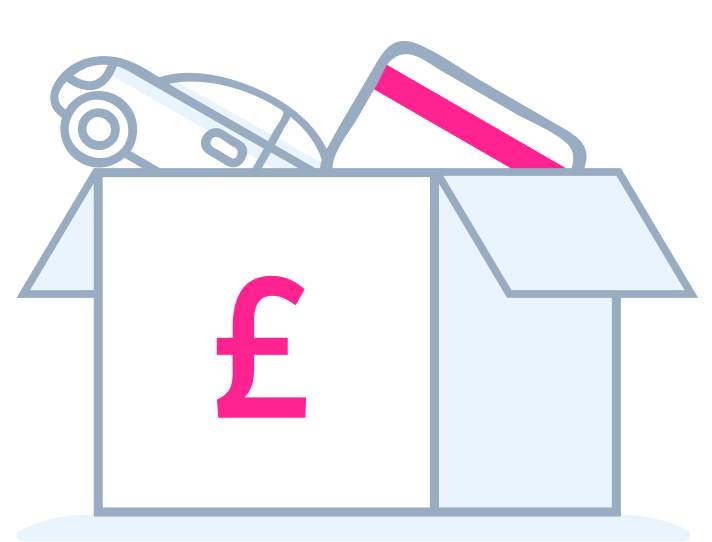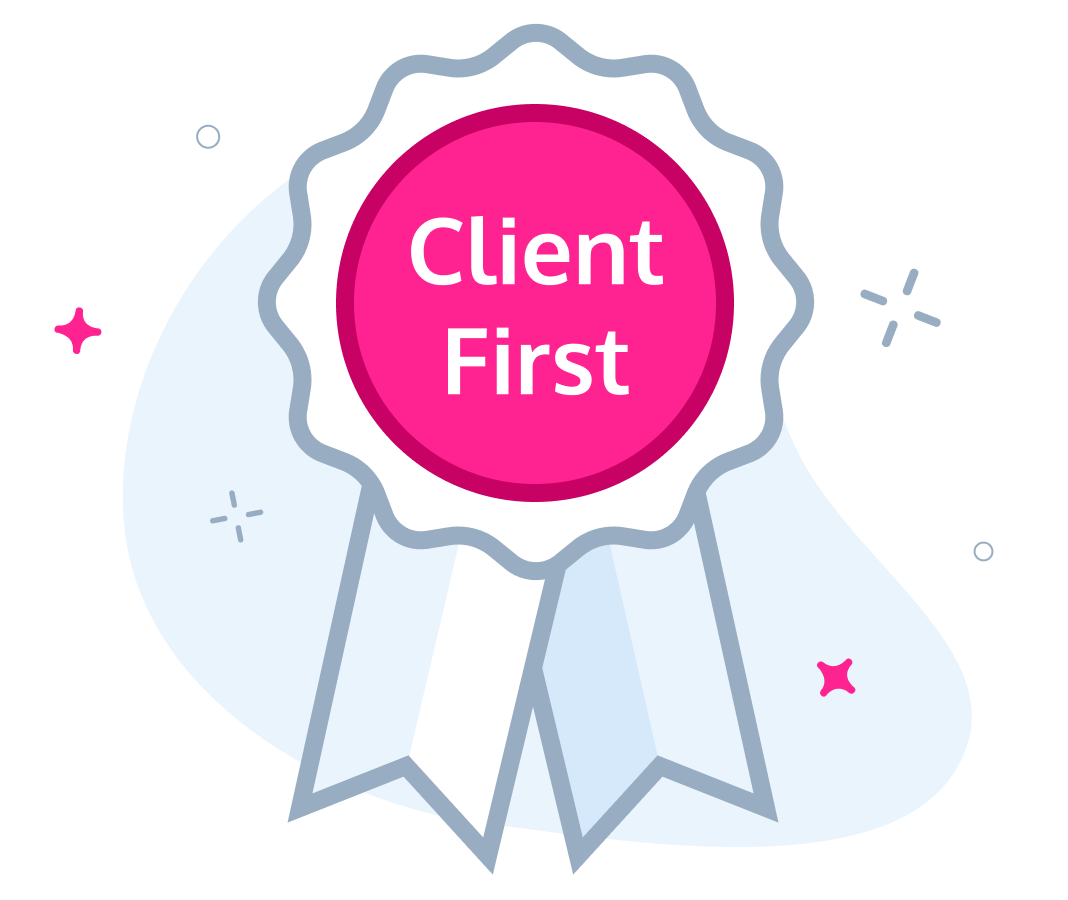Secured Loan Lenders
Find out the inside criteria

Ready for the VIP Treatment?
When it comes to securing a loan, it’s always helpful to know what the lenders are looking for. That’s why we’re letting you in on the most common criteria they consider.
And don’t worry, just because you don’t meet every requirement doesn’t mean we can’t help you get that loan you need.
Here’s what you can expect when applying for a secured loan:
- Affordability: Lenders want to make sure you’re able to comfortably pay back the loan each month.
- Credit Score & History: A good credit score and history will help increase your chances of getting approved.
- Property Equity: Lenders also look at how much equity you have in your property.
Let’s start at the beginning.
When were you born?

How old are you?
To be eligible for a secured loan, you must be at least 18 years old. Although, most lenders prefer applicants who are over 21. To ensure successful repayment, the oldest you can be at the end of the loan term is 85.
Do you live in the UK?
If you’re looking to secure a loan, it’s important to have a permanent residence in the UK. We’ll also need to see three years of residential address history. This information can usually be found on the voter’s roll, but if not, you can provide utility bills or similar documentation.
What about identification?
Despite the advancements in technology, most lenders still require a valid form of identification for loan application purposes. You can provide a passport, driver’s license, or any other government-issued photographic ID. It’s always a good idea to keep these documents handy, just in case.

Do I need a property for a Secured Loan?
Good news! If you’re a property owner with a mortgage, you’re on the right track for securing a loan. The property you use as collateral doesn’t have to be the place you call home. It could be a rental property or even a vacation home.
Marriage & Joint Ownership: If you’re married, your spouse may also have to apply or sign a waiver consenting to the loan. If there’s another person on the mortgage with you, they’ll need to join in on the loan application process too.
No Mortgage? No Problem (Well, Sort Of): If you own your property outright without a mortgage, a secured loan may not be an option for you. But don’t worry, you might still be able to get a personal loan if the amount you need is smaller. Or a 1st mortgage if you need a larger amount. It’s always a good idea to check your options!

What about the equity in my property?
When it comes to securing a loan, the lender will want to get an accurate idea of the value of your property. At Loan.co.uk, we’ve got you covered – we’ll always pay for the valuation costs, so you don’t have to worry about a thing!
There are a few different ways to determine the value of your property, and it all depends on how recently you bought it. If you purchased your property in the last six months, some lenders might use the price you paid for it as the value. If not, there are three common methods to consider:
-
- Computer-generated Valuation – This is the quickest and most affordable option, where a computer program estimates the value of your property.
- Drive-by Valuation – Here, a qualified surveyor will drive past your property and assess its value by comparing it to other similar properties in the area.
- Full Valuation – This is a more in-depth approach, where a qualified surveyor will visit your property and thoroughly evaluate it. This is typically used for larger loans or when the equity in the property is smaller.
If you’re part of a Shared Ownership, Right to Buy, Key Worker, or Help to Buy scheme, it’s important to note that the equity calculation will only be based on the portion of the property that you own, not the property’s total value.
So, whether you’re a seasoned property owner or just starting out, rest assured that Loan.co.uk has got you covered when it comes to determining the value of your property.

Let’s Talk Income?
When it comes to securing a loan, lenders want to make sure you have the financial stability to pay it back. So, what’s the deal with income?
Whether you’re an employed superhero or a self-employed wonder, they’ll want to take a look at your income. This will affect the type of income proof they’ll ask for and how they’ll determine your available income.
Here’s a little inside info: most secured loan lenders will take a look at your gross annual income and multiply it by 6 or 7 to get a rough estimate of how much you can afford to borrow. For example, if your family earns a gross income of £50,000 per year, you could potentially borrow up to £350,000 in total between your first mortgage and a second charge.
So, in short, income is a crucial factor in securing a loan, and it’s good to be prepared to share the details of your financial stability. And who knows, you may surprise yourself with how much you can borrow and how cost-cost it could be!

I am employed – what do I need to know?
When you’re applying for a secured loan, lenders want to make sure that you’ll be able to repay the loan comfortably and on time. This is why they take into consideration several factors, including your job security. They’ll want to know if you’re in a probation period or have recently changed jobs or careers, as this could impact your future income.
When it comes to proof of income, having 3 months’ recent payslips or a P60 readily available will help support your application. Additionally, if you have any additional sources of income, such as bonuses or commissions, it’s a good idea to let the lender know. Some lenders may only consider a portion of your bonus pay if it’s not guaranteed, so it’s important to have a clear understanding of the lender’s criteria and requirements.
In general, the lender will be looking for consistency of future income, which is why having a stable job is a key factor in securing a loan. It’s important to keep in mind that different lenders may have different criteria and calculations, so it’s worth shopping around to find the best option for you.

Show Me the Money: Proving Your Income as a Self-Employed Borrower
Being your own boss is a thrilling ride, but when it comes to securing a loan, it can be a bit more challenging. Don’t worry, we’ve got your back! Here’s what you need to know about proving your income as a self-employed borrower.
Lenders generally look for self-employed borrowers who have been in business for at least 12 months and can provide proof of income. This may include documents like a SA302 or accountants certified tax calculations, as well as recent company bank statements.
It’s worth noting that if you own more than 25% of a company, you might be considered self-employed, even if you receive a PAYE salary. So, be prepared to factor this into your loan application and have all your documentation ready to go!
How do Lenders look at My Expenses?
When you’re considering taking out a secured loan, lenders will take a closer look at your finances to determine what you can afford. This includes not just your income, but also your monthly expenses.
To calculate your affordability, the lender will subtract your monthly expenses from your income. These expenses include your mortgage payment, credit card bills, loan repayments, and other necessary expenses like car payments, energy bills, school fees, and your general living expenses.
To determine your general living expenses, lenders may use the ONS data, which is the government’s official data on household expenses, or they may use an estimate based on the information you provide.
It’s important to be as accurate as possible when providing information on your expenses, so that the lender can get an accurate picture of what you can afford. But don’t worry, being a bit off on the exact numbers won’t make or break your loan application. Lenders understand that expenses can vary from month to month and they just want to get a general idea of your financial situation.
The goal is to find a loan that you’re comfortable with and that fits your budget, so be honest about your expenses and work with your lender to find the best solution for you.

How do I consolidate other loans and credit cards?
Consolidating your high-interest debt can be a smart financial decision. Secured loans are a great option to consider if you’re looking to simplify your monthly payments and potentially save money on interest charges.
When you apply for a secured loan, the lender will want to know the details of the debt you’re looking to consolidate. This means you’ll need to provide the current settlement figures for each loan or credit card. This information will help the lender determine the amount of money you need to pay off your debt and create a new loan payment plan for you.
The process of debt consolidation through a secured loan can be straightforward, and it can give you peace of mind by simplifying your monthly payments and potentially reducing the interest charges you pay. With one manageable monthly payment and a lower interest rate, you can focus on paying off your debt and reaching your financial goals.
This way, you can say goodbye to multiple payments each month and hello to a clearer financial picture.

What about my credit score?
If you’re thinking about getting a secured loan, you might be curious about how your credit score fits into the equation. Good news! A solid credit score is always a plus, but it’s not a deal breaker. Our friendly and knowledgeable financial advisors will work with you to determine the best option for your financial situation.
Whether you have a great credit score or it could use some improvement, don’t worry, we’ve got you covered. Let’s work together to find the solution that’s right for you!

Make your loan journey a breeze with our App!
Our user-friendly app is the perfect way to keep track of your secured loan application. From uploading your paperwork to an in-app chat with your advisor, everything is just a few clicks away.
Simply log in, snap a photo of your documents or upload a file, and voila! Your paperwork will instantly be added to your case, and your dedicated application manager will be notified.
Say goodbye to complicated processes and hello to a smooth and stress-free loan journey with our app!
4.9/5 Rating
“Excellent” rating at Trustpilot
How are Loan.co.uk’s Secured loan broker fees up to 60% lower than other brokers?

Be Smart ! Don’t pay high secured loan broker fees
Say goodbye to high secured loan broker fees and hello to smart savings! Our cutting-edge technology has allowed us to significantly reduce our processing costs, which we pass on to you. Our broker fee is up to 60% lower than other major UK secured loans and homeowner brokers.
Plus, our fee covers all the necessary costs, including legal expenses, valuation, and references. It’s only charged if you successfully receive the loan you want and is usually added to the loan.
And the best part? There’s no obligation. You can back out at any time without any cost. So, why not make a smart choice and save big with us!
” Very smooth process, great communication and a good interest rate, low fee structure“
Verified client reviews.co.uk
Representative Example for second charge mortgages UK:based on borrowing £18,000 over 120 months. Interest Rate: 5.5% fixed for 60 months with instalments of £213.33. Followed by 60 months at the lenders standard variable rate of 5.7% with instalments of £214.36. Fees: Broker fee (£1,062); Lender fee (£595). Total amount payable £25,756.4 comprised of; loan amount (£18,000); interest (£6,004.4) including broker fee and lender fee. Overall cost of comparison 7.902% APRC. This means 51% or more of our clients receives this rate or better for this type of product. We have arranged borrowing with rates from 3.4% to 29% APRC which has allowed us to help customers with a range of credit profiles. We are a broker not a lender.
Second charge mortgages have a minimum term of 36 months to a maximum term of 360 months. Maximum APRC charged 29%. If you are thinking of consolidating existing borrowing you should be aware that you may be extending the terms of the debt and increasing the total amount you repay.
Think carefully before securing other debts against your home. Your home may be repossessed if you do not keep up repayments on your mortgage.